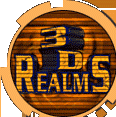The Apogee Legacy #12 - Mike Maynard
Today our "Apogee Legacy" Interview series finishes up it's third month with an entry from Mike Maynard. Mike and his group ("Jam Productions") put out two games through us. The first was released on Dec 3, 1993, and was titled "Blake Stone: Aliens of Gold". The second was put out on Oct 28, 1994 and was titled "Planet Strike: A Blake Stone Adventure".
Mike was one of the three guys who made up "Jam Productions", and had the arduous task of working on the first 3D action game by us in the post Wolfenstein 3D era. Blake Stone had many firsts in 3D gaming, one of which was the rather common practice of NPC's, or "Non Player Characters". These were characters that would give you helpful information, so just going in and shooting everything you see was not the way to go here. Some other novelties in Blake Stone was the fact that you could go backwards to levels you already had visited. In some cases this was necessary to unlock certain locked areas in upper levels.
Planet Strike was also novel in our company history, as it was the first time we ever put out a game in the retail channel directly. Later on, some of our earlier games ended up there, but Planet Strike was our first ever foray into the arena of "Hey, pay attention to my box on the store shelf!" (that's why there's a woman on Planet Strike's cover art when there was no woman in the game at all).
Anyway, Mike has continued to stay active in the gaming industry since his time with Apogee in 1994. He's worked at such gaming companies as 7th Level, Ion Storm, Third Law Interactive, TKO Software, and is currently employed at id Software. Read on to hear what Mike has to say about his time with us (now 13 years ago).
Past Pioneers of the Shareware Revolution
Issue #12 - Mike Maynard
1) How did you first come in contact with Apogee?
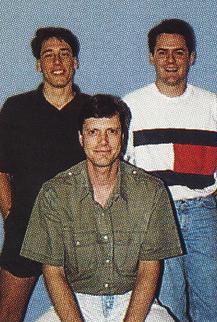
|
|
The JAM team in 1993 (Mike's on the left) |
In 1990, I worked at Softdisk Publishing in Shreveport, LA. It was a very interesting time because all the original guys that ultimately formed id Software also worked at Softdisk. Of course they ultimately left to form id and work with Apogee on the Commander Keen series and eventually Wolfenstien. With the success of Wolfenstien, Apogee wanted more games using that technology. John Romero recommended a friend (Jim Row) and me to Apogee and we signed a deal to create the shareware version of Blake Stone.
2) Was there a reason you decided to work with Apogee, say versus going on your own or working with another company?
We weren't necessarily shopping game ideas to different publishers and we certainly couldn't fund ourselves. (However, we did create a side-scrolling, space-themed shooter for the Amiga in our spare time called Outpost 13. We ended up selling it to Compute! magazine for $1000! woohoo!.)
Apogee was looking for a team to create a game using id's Wolfenstein technology. We had experience making games and had worked with id's previous technologies.
3) Looking back, was there anything Apogee could have done better, regarding the marketing and distribution of your game?
At the time, Apogee did several things to market their games. The most cost-effective was to send nice, color fliers to previous buyers of their games. For instance, anyone that bought Wolfenstien 3d was sure to get the advertising flier since they were similar games (FPS, using Wolf 3d technology). I believe they also included fliers with actual products that people bought, too. They also placed general 'Apogee' ads in magazines that listed several games so the cost of the ad could be spread over several products. We were fairly pleased with all of these methods.

|
| Mike in 1992 before Blake Stone development started |
4) Do you think your game was made better or worse by working with Apogee?
They made certain areas of the gameplay better by taking out monotonous gameplay (for example: traversing back and forth through various floors of the buildings) and adding bosses throughout the game to give the game intermediate goals. However, these changes (and others) were made fairly late in the development cycle which actually delayed the release a bit. I really don't remember a lot of input or even a need to see the game on a regular basis until at least 12 months of development. While that made for 'no-hassle' development I think it hurt us in the end.
Considering Blake Stone was released one week before another little game called DOOM, that delay pretty much sealed our fate. We had decent pre-orders and the first couple of months were pretty good but sales dropped pretty quickly. Had we gotten more input from Apogee earlier on in the development process I think we could've released the game 3-4 months earlier than we did.
5) Apogee had a policy of letting the designer or studio retain full intellectual property rights to their game. Nowadays, it's rare to find a publisher who allows this, especially if the publisher is providing the funding. Do you believe that it's best for the creator to retain IP rights? Why or why not?
You could argue either way on this topic. Since I'm not a publisher, I'll go with the argument that the developer should retain all IP rights.
Simply put, a publisher isn't going to fund a project that they think won't make them a reasonable profit. So whatever they fund (whether they own the IP or not) they're betting that the game will make them money.
If they own the IP and the project fails, the IP is worthless so it doesn't matter who owns it. If they DON'T own the IP and the project is a success, they'll still make money (and profit) on the HUGE percentage of royalties they'll get from that project. So a publisher taking ownership of a developer's idea is purely for control and greed.
5a) And if applicable, have you benefited from retaining ownership of your own IP?
5b) Do you think there'll ever be a sequel to your game(s)?
We did the sequel to Blake Stone shortly after it was released; it was called Planet Strike and published by FormGen. :)
As far as a sequel with up-to-date technology, I doubt it. I've talked to people that think a new game (FPS or otherwise) based on the Blake Stone IP would be cool. However, the IP alone wouldn't attract more than a handful of old-school gamers. Any new Blake Stone game would pretty much have to reinvent the IP and stand on its own.
6) Is there any story/incident that stands out as interesting during your time associated with Apogee?

|
| Blake Stone Artwork |
There's nothing that really stands out but some details about development include:
- After a couple months of dealing with art problems Apogee was generous to increase our monthly funding so we could bring in a full-time artist, Jerry Jones.
- Dr. Pyrus Goldfire was originally called Dr. Goldstern. One person sent an email to Apogee complaining about how the name "Goldstern" portrayed Jewish people as evil. So we had to change the name.
- Joe Siegler sent an email on Thanksgiving Day saying that the version we uploaded for testing didn't work. So I went up to the freezing office and uploaded a new version of the game. I ended up calling the management at his house bitching about the lack of heat in the building.
- Some people (bank tellers n such) would ask us if JAM Productions was a music company. JAM was Jim And Mike.
- The game was so successful at one point we were making $1 million a month. .. Oh wait, that was Doom. Nevermind. haha
7) Apogee was an early pioneer in terms of teaming up with external designers and studios, and continues to do so even to this day (currently working with Human Head Studios on Prey). Why is it that so few other studios do this (mentor and fund outside projects with lesser known teams)?
It has to be money. Otherwise, every studio would be working with external teams and try to become the next EA or Activision. I know at Third Law Interactive and TKO Software / Dallas, we were happy just to get projects for the internal teams to work on. Working with external teams was the last thing on our minds.
8) What the biggest difference in the industry nowadays versus when you worked with Apogee?
Everything associated with making games has gotten bigger.
- The size of the development team - While JAM Productions did contract out music and a small amount of art, the majority of the game was created by 2 programmers and 1 artist. We did our primary jobs (programming and art) as well as game design, level design, business matters, production, and publisher relations.
- The budget needed to create the game - JAM's total budget for Blake Stone (18 months development time) could barely pay for a small team of, say, 12 people for 1 month. If you're licensing a quality engine, be prepared to spend the salary of several quality people.
- The technology needed to compete against other games - The technology used in today's AAA games are much more impressive and more complex than when we created Blake Stone. And that doesn't just pertain to the graphics engine. Other things like AI, physics, networking, and animations have become much more complex.
9) What have you been doing since your time with Apogee?
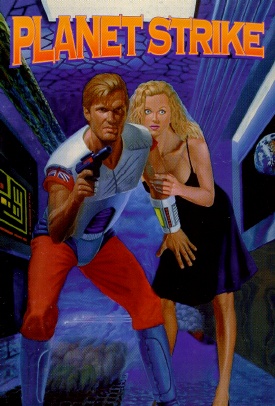
|
| Planet Strike Artwork |
Making video games, of course! Ask me in another 12 years and the answer will be the same; that is unless I'm able to get my PGA Tour card! ;)
Here's a quick rundown of companies and games (newest to oldest):
ID SOFTWARE
<< wouldn't you like to know >>
TKO SOFTWARE
Call of Duty (Nokia NGage)
Leisure Suit Larry (Nokia NGage)
Ms Pacman: Maze Madness (PS2 / PC)
PARADIGM ENTERTAINMENT
Terminator 3: Redemption (PS2 / XBOX)
THIRD LAW INTERACTIVE
KISS: Psycho Circus (PC)
Aliens vs Predator 2: Primal Hunt (PC)
NOLF: Game of the Year Edition (PC)
WWII: Normandy (PC)
WWII: Iwo Jima (PC)
Minigolf Megaworld / Minigolf Master 2 (PC)
ION STORM
Daikatana (PC)
7TH LEVEL
Return To Krondor (PC)
10) If you're no longer making games, have you thought about returning to this industry? If not, why not?
N/A
11) Looking back, are there any missed opportunities that you wish you'd have jumped on?
I had the chance to join id Software early on but I was already knee-deep into JAM Productions and Blake Stone. I'm not the kind of person that just quits something I've started unless I'm really forced to. I wanted to finish Blake Stone and try to grow JAM into something cool. Besides, I finally got the chance to work at id Software again (been there about 6 months now) and I'm excited about helping them create their next generation of games!
Even still, the companies I've worked with has allowed me to interact with a lot of talented people and different technologies. But mostly, I really like the fact that I've been able to work on many different genres of games including: First Person Shooters, Real-time Strategy, Third Person Action, and even a couple games my son has been able to enjoy (Minigolf and Ms Pacman). There's nothing cooler than having your son enjoy games you've created.
12) Other than your game(s), what's your favorite game released or produced by Apogee (or 3D Realms)?
The games I played the most were Wolfenstein 3D and Balls of Steel.
12a) And what's your favorite 2-4 games released by anyone else?
(in no particular order)
Quake
Unreal Tournement
Tiger Woods Golf
Grand Theft Auto
Rollercoaster Tycoon / Sim City (sim games, in general)
Any game my son wants me to play with him.
13) Is there anything else you'd like to add about your time here or to fans of your title(s)?
Of all the games I've worked on, Blake Stone was probably the most fun and intense at the same time. Simply because there were only three of us (Jim Row, Jerry Jones, and Myself) to do pretty much everything. We did the Game Design, Programming, Art, Level design, Working with contractors, Business matters, and LOTS of other little things that simply take a ton of time and effort. It was the first big game I created from the ground up and except for the timeframe, I think it turned out pretty good.
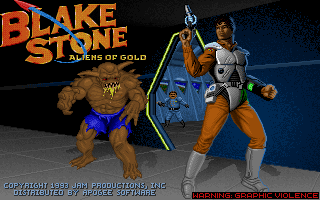
Unused Title Screen from Blake Stone Beta
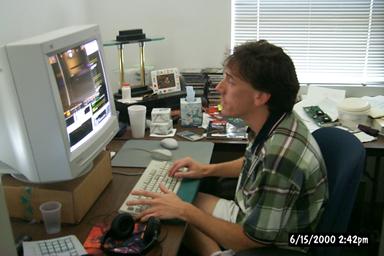
Mike in 2000 when at Third Law
Thanks again to Mike for helping out with his questions. Since Mike was local, it was easy enough to go over to id and say Hi. Was nice to go back and reminise with Mike about his time with Apogee back then. We still sell both Blake Stone & Planet Strike, and if you're interested in trying them out, you can do so with the links below. One other thing Planet Strike is notable for is being the only game in our history that does not have a shareware/demo version. As it was our first retail game, the decision was made back then not to have a demo. It was thought that the existing Blake Stone game was enough of a "demo" for the retail Planet Strike game.
One final comment about Blake Stone.. Just where were all those medics? ;)
- Our Blake Stone Catalog Page
- Our Blake Stone Catalog Page
- Shareware Episode of Blake Stone
- Wikipedia Entry for Blake Stone
Make sure and tune in again next Monday morning, when we bring you the next in our Legacy Interview series.
Posted by Joe Siegler on March 27, 2006 at 2:04 PM | Permalink
| Discuss this story on our forums
News Categories: About 3DR / 3DR Staff | The Apogee Legacy
